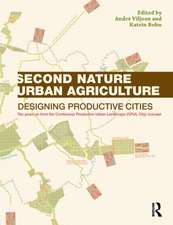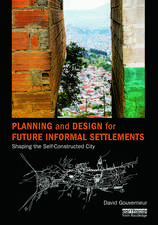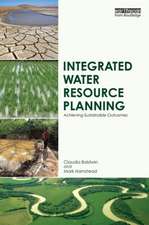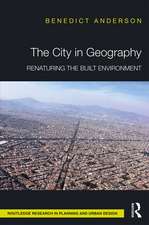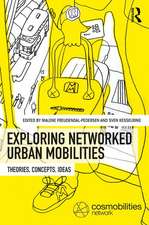Contemporary Urban Landscapes of the Middle East: Routledge Research in Landscape and Environmental Design
Editat de Mohammad Gharipouren Limba Engleză Paperback – 12 feb 2018
| Toate formatele și edițiile | Preț | Express |
|---|---|---|
| Paperback (1) | 450.40 lei 43-57 zile | |
| Taylor & Francis – 12 feb 2018 | 450.40 lei 43-57 zile | |
| Hardback (1) | 821.14 lei 43-57 zile | |
| Taylor & Francis – 23 mar 2016 | 821.14 lei 43-57 zile |
Din seria Routledge Research in Landscape and Environmental Design
-
 Preț: 310.22 lei
Preț: 310.22 lei -
 Preț: 310.55 lei
Preț: 310.55 lei -
 Preț: 436.14 lei
Preț: 436.14 lei -
 Preț: 415.67 lei
Preț: 415.67 lei -
 Preț: 436.14 lei
Preț: 436.14 lei -
 Preț: 339.95 lei
Preț: 339.95 lei - 18%
 Preț: 1063.41 lei
Preț: 1063.41 lei -
 Preț: 310.65 lei
Preț: 310.65 lei - 17%
 Preț: 272.02 lei
Preț: 272.02 lei - 17%
 Preț: 258.24 lei
Preț: 258.24 lei - 21%
 Preț: 258.50 lei
Preț: 258.50 lei - 21%
 Preț: 255.66 lei
Preț: 255.66 lei - 19%
 Preț: 256.32 lei
Preț: 256.32 lei -
 Preț: 385.25 lei
Preț: 385.25 lei - 25%
 Preț: 767.93 lei
Preț: 767.93 lei - 20%
 Preț: 262.96 lei
Preț: 262.96 lei
Preț: 450.40 lei
Nou
Puncte Express: 676
Preț estimativ în valută:
86.21€ • 93.68$ • 72.46£
86.21€ • 93.68$ • 72.46£
Carte tipărită la comandă
Livrare economică 21 aprilie-05 mai
Preluare comenzi: 021 569.72.76
Specificații
ISBN-13: 9781138490291
ISBN-10: 1138490296
Pagini: 316
Ilustrații: 93
Dimensiuni: 156 x 234 x 20 mm
Greutate: 0.48 kg
Ediția:1
Editura: Taylor & Francis
Colecția Routledge
Seria Routledge Research in Landscape and Environmental Design
Locul publicării:Oxford, United Kingdom
ISBN-10: 1138490296
Pagini: 316
Ilustrații: 93
Dimensiuni: 156 x 234 x 20 mm
Greutate: 0.48 kg
Ediția:1
Editura: Taylor & Francis
Colecția Routledge
Seria Routledge Research in Landscape and Environmental Design
Locul publicării:Oxford, United Kingdom
Public țintă
Postgraduate and UndergraduateCuprins
1. Urban landscape: public space and environment in cities of the contemporary Middle East (MOHAMMAD GHARIPOUR), 2. Between garden and geography: landscape as an emergent concept in the wider Middle East (JAMES L. WESCOAT JR.), 3. In pursuit of a European city: competing landscapes of Eskis¸ehir’s riverfront (KIVANÇ KILINÇ AND DUYGU KAÇAR), 4. Inventing the seashore: the Tel Aviv-Jaffa promenade (ELISSA ROSENBERG), 5. Sculpted landscape: the unbuilt public square of Islamabad (FARHAN KARIM), 6. Paradise reconsidered: the early design history of Pardisan Park in Tehran (KATHLEEN JOHN-ALDER), 7. Aspiring masonry: design thinking and experimental vernacularism in Ferdowsi Garden (HOOMAN KOL), 8. Cairo’s urban parks: space, place, and meaning (AKEL ISMAIL KAHERA), 9. Beyond greening: approaches to the contemporary landscape in the United Arab Emirates (KEVIN MITCHELL), 10. Contemporary landscape as urbanism: emergent ecologies of the Doha Corniche (ANNA GRICHTING), 11. The sovereign global city: Omani post-traditional landscape urbanism (HALA F. NASSAR AND ROBERT HEWITT), 12. Epilogue: urban landscapes and future sustainable urban qualities in Middle Eastern cities (ASHRAF M. SALAMA)
Notă biografică
Mohammad Gharipour is Associate Professor at the School of Architecture and Planning at Morgan State University in Baltimore, USA. He obtained his master’s in architecture from the University of Tehran and his Ph.D. in architecture and landscape history at Georgia Institute of Technology, USA. He has received several fellowships and awards and published six books including Persian Gardens and Pavilions: Reflections in History, Poetry and the Arts. He is the founding editor of the International Journal of Islamic Architecture.
Recenzii
‘This collection of a dozen essays covers a variety of subjects (Cairo parks, Tehran parks, xeriscapes, and stonework among them). An interesting notion appears in chapter 2, in which James Wescoat Jr., ASLA, makes the case that even the concept of "landscape" in the Middle East is fairly recent. It refers to neither just gardens nor geography there, he says, but a combination of both.’
Landscape Architecture Magazine
Landscape Architecture Magazine
Descriere
Contemporary landscape projects, either designed as public plazas or public parks, have played a significant role in transferring the modern Middle Eastern cities to a new era and also to transform to a newly shaped social culture in which public has a voice. Gharipour considers what ties these projects to their historical context, and what regional and local elements and concepts have been used in their design.

